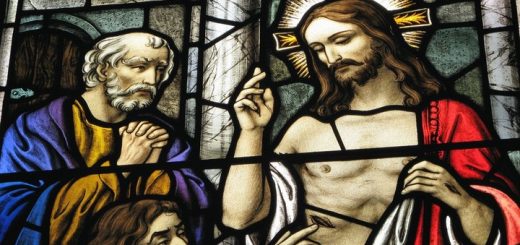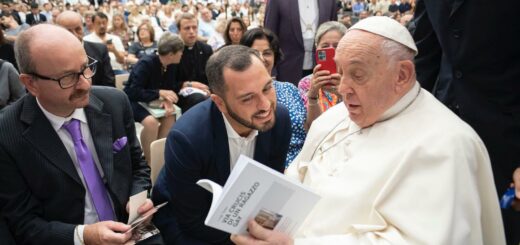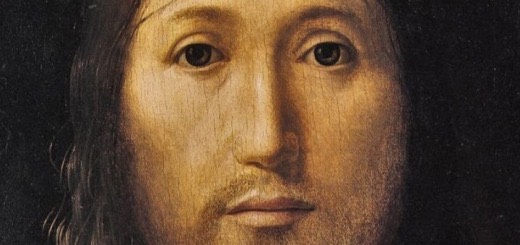Donne e persone LGBT+ pagano il prezzo più alto per mantenere l’unità nella Chiesa cattolica
Article by Mary McAuliffe* published on the site America Magazine (USA) on January 2, 2025, freely translated by Luigi and Valeria de La Tenda di Gionata
Like many of those who hope for a tangible improvement in the status of women and LGBTQ+ people in the Catholic Church, I saw the Synod on Synodality as a mixture of high expectations, disappointment, and a careful search for God's grace at work in history.
I had cautious optimism that my Church might be ready to make more space for LGBTQ+ Catholics, allowing them to be authentically themselves, and to more fully honor the baptismal dignity of women by restoring the female diaconate. I now clearly understand that embarking on this synodal journey with my Church in a spirit of prayer will often mean putting aside my desires for immediate large-scale change.
I am trying to take seriously the words of Cardinal-designate Timothy Radcliffe, according to whom this synod, and synodality itself, is not a means of carrying out specific interventions, but rather «evokes new ways of being the Church, that is, of entering into relationships with with each other much more deeply in Christ, and to enter into relationship with Christ much more deeply with each other."
Synodality should keep us united with each other and with Jesus; yet I am still left wondering how much the people of my Church really want to enter into deeper communion with Christ together with me and our LGBTQ+ brothers and sisters.
In December 2023, I joyfully shared the news of the release of the statement Trust Supplicans (which allows for the pastoral blessing of people in same-sex unions) with my high school senior religion students, when I received a notification in the middle of class.
Da allora, però, non ho più sentito tanti riferimenti alla comunità LGBTQ+ da parte del Sinodo stesso. Sono rimasta sconcertata dalla dichiarazione del cardinale Víctor Manuel Fernández, prefetto del Dicastero per la Dottrina della Fede, secondo cui «la questione del diaconato femminile non è matura» e che i gruppi di studio sinodali non avrebbero preso in considerazione questa possibilità.
E sono indignata dalla descrizione offensiva fatta dal vescovo Anthony Randazzo dell’ordinazione femminile come una «ossessione» dei cattolici del Nord del mondo che distoglie l’attenzione dalla tragedia delle donne emarginate nel Sud del mondo. Ho vissuto in Oceania (la regione che ricade sotto la guida pastorale del vescovo Randazzo) e trovo spaventoso che egli non riesca a rendersi conto del fatto che l’emarginazione delle donne nella Chiesa rappresenti in qualche modo una legittimazione religiosa alla loro emarginazione nella società in generale.
Quando ho letto che né il diaconato femminile né le questioni relative alle persone LGBTQ+ erano all’ordine del giorno dell’incontro sinodale di ottobre, ho intuito che la paura di una frattura nella Chiesa universale è ancora un grosso ostacolo anche solo per discutere questi argomenti – e che, ancora una volta, alle donne e ai cattolici LGBTQ+ sarebbe stato chiesto il sacrificio di restare in silenzio e avere pazienza per il bene dell’unità.
Michael Sean Winters del National Catholic Reporter (agenzia giornalistica USA che si occupa di fede e religione, N.d.T.) lo ha suggerito in un episodio del podcast Jesuitical del sito America Magazine. Riferendosi alle questioni dell’ordinazione femminile e della comunità LGBTQ+, ha detto che «qualunque sia il vostro problema specifico», non vale la pena di rischiare l’unità della Chiesa.
Posso comprendere questo punto di vista, sia del signor Winters che dei partecipanti al sinodo, compreso lo stesso papa Francesco. Ho lavorato insieme ai gesuiti per due anni negli Stati Federati di Micronesia e l’ultima cosa che vorrei è che si creasse nella Chiesa una frattura completa basata su motivazioni culturali o tra il Nord e il Sud del mondo. Devo accettare che, per il momento, il fatto di non trattare questi argomenti può essere il prezzo da pagare per evitare uno scisma. Ma non posso ignorare il fatto che questo prezzo si ripercuota in maniera più pesante sulle donne e sulle persone LGBTQ+.
We must ask ourselves whether the Church is willing to recognize the profound suffering that this reality causes in many members of the body of Christ. No matter what other doors the synod opens, women will still be asked to join and minister in a Church that claims God does not consider us fit to represent Christ on the altar. LGBTQ+ Catholics will still be asked to belong and minister in a Church that defines part of their way of loving as "intrinsically disordered."
Having to continually ask yourself: "What does my Church think of me?" and “Does the Church really believe that I am made in the image of God?” it is a cross that is essentially unique to women and LGBTQ+ Catholics.
The lack of initiative on these issues on the part of the Synod, followed by the re-election of a President of the United States who proclaims that he wants to reduce the legal protections of LGBTQ+ people and who insists that he will implement his women's protection program «which to women like it or not,” has left many American Catholics reeling from the double gut punch of having to once again face what our Church and our country really think of us.
If we want to be a synodal Church, are we all ready to recognize and honestly deal with the sacrifice that is asked of women and LGBTQ+ Catholics? Is our Church capable of at least recognizing the sacrifice it is asking of us? Our parishes are able to take our pain seriously without trying to paternalistically "re-explain" to us what the official doctrine of the Church is, or thinking of consoling us and putting an end to our suffering by listing all the other service possibilities available to us women in the Church?
In his pastoral activity with LGBTQ+ believers, the synod delegate James Martin, SJ, often says: "God already loves you, your Church is learning to love you." I, too, pray that synodality will be the way through which my Church learns to fully love both me and my LGBTQ+ brothers and sisters, and that God will grant me a life long enough to see the concrete realization of this love.
*Mary McAuliffe is a religion teacher in Washington DC and a student at the Clough School of Theology and Ministry of Boston College.
Original text: Women and LGBTQ Catholics are paying the price for church unity






